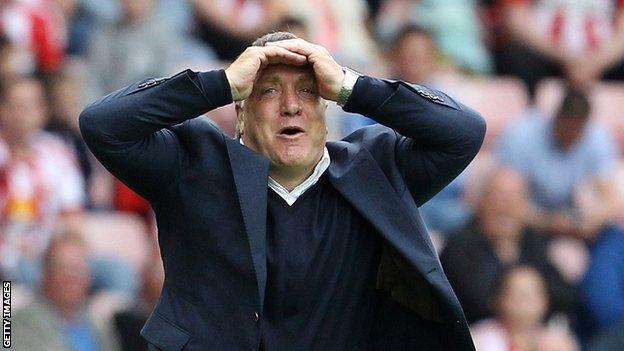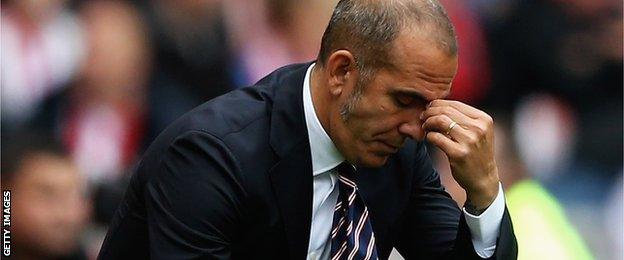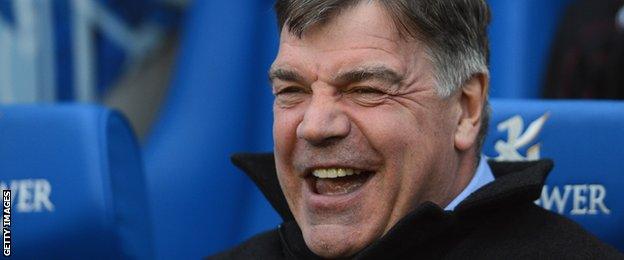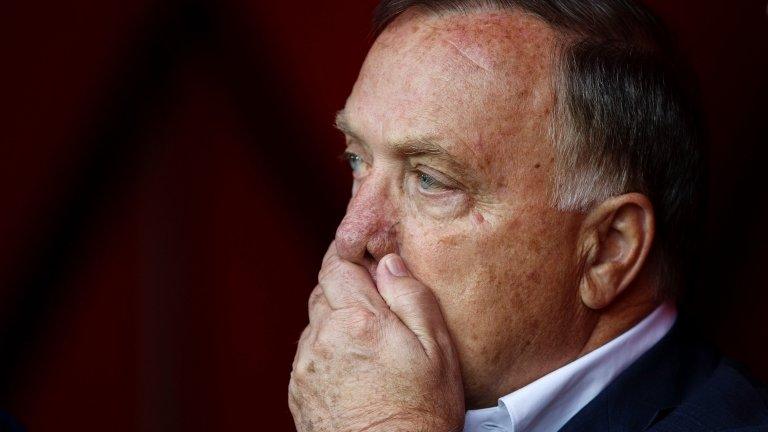'Dick Advocaat exit latest crisis in repeating Sunderland saga'
- Published
- comments

Dick Advocaat abandoned retirement to lead Sunderland for an extra season after guiding them to safety last season
Dick Advocaat ignored all his natural instincts and vast exposure to football's shifting fortunes by agreeing to lead Sunderland this season.
The 68-year-old Dutchman kept a promise to wife Dieuwke when he decided to leave his role as head coach at the Stadium of Light after guiding the Black Cats to Premier League safety as caretaker-manager last term.
But, in the face of further persuasion from club owner Ellis Short and sporting director Lee Congerton, Advocaat had a change of heart and returned - only to last just eight league games before leaving once more after the 2-2 home draw with West Ham United.
So how did a story that should have had a happy ending turn so sour?
'Something very wrong at the heart of Sunderland'
The average reign of Sunderland's past seven full-time managers comes to a grand total of 44 games - hardly a tale of stability and continuity.
Managing Sunderland these days comes accompanied by the law of diminishing returns - the story of a quick fix followed by an even quicker decline.
How can a club with such a large, loyal and long-suffering fanbase continue to get it so wrong?
Dick Advocaat's final interview as Sunderland manager
Sunderland have become the template for short-term crisis management followed by the demise of the man in charge. Short is ultimately responsible for these appointments and his credibility has been damaged further by the departure of Advocaat, who only signed his deal to come back to Sunderland at the start of July.
A pattern has clearly emerged with the appointment of the past three managers - all were appointed to save the club from relegation. They accomplished that mission but the escape has never been capitalised on.
Paolo di Canio was appointed on 31 March 2013 in succession to Martin O'Neill, with Sunderland one point above the relegation zone with only seven games left.
The fiery Italian's madcap approach worked initially, including a 3-0 derby win at Newcastle United, but ended in shambles the following September when he was sacked after only 13 games in charge.
He was succeeded by Gus Poyet, who arguably masterminded an even more dramatic escape from relegation at the end of the 2013-14 season. A draw at champions-elect Manchester City and wins at Chelsea - Jose Mourinho's first home Premier League defeat in 78 games as manager - and Manchester United kept them up.
Poyet also took Sunderland to the League Cup final, where they lost to Manchester City, but once more the euphoria did not last and he was out after 60 games and only 14 wins, a percentage of 23.3%, with relegation looming once more in March 2015.
Advocaat stepped in on a temporary basis and history repeated itself, the joy of survival with a goalless draw at Arsenal in May replaced by the doom of this season and the hugely respected coach on the way out.

Paolo di Canio said Ellis Short is "the real origin of all these troubles" at the club
Sunderland has become the ultimate boom and bust - the problem being the boom is quick and the bust even quicker.
The supporters have pointed the finger firmly at the owner, chanting "Are you watching Ellis Short?" during the home loss to Norwich City in August, amid claims a supposed £50m transfer fund had not been forthcoming for Advocaat.
There was black humour too, with the sight of vast empty spaces around the Stadium Of Light towards the end of heavy home defeats prompting quips supporters were now staying until the final whistle to avoid the traffic.
It was no laughing matter for Short, the American responding in his programme notes for the home game with Swansea City: "I have never taken money out of the club. In fact, I have funded significant shortfalls each and every season."
He added: "Has the money been spent wisely? No - that much is clear and ultimately that is my fault. But it is not a result of lack of ambition or commitment."
What is also clear is that there is something very wrong at the heart of Sunderland. It is not an accident that managers are appointed who do not stay, players signed who are simply not good enough.
So now Short must appoint another manager - and part of his task will be to persuade his next choice it will be different this time around.
Sunderland managerial history | |||
|---|---|---|---|
Manager | Reign | Games | Win percentage |
Roy Keane | 2006-2008 | 53 | 28.3% |
Ricky Sbragia | 2008-2009 | 23 | 21.7% |
Steve Bruce | 2009-2011 | 89 | 28.1% |
Eric Black (caretaker) | 2011 | 1 | 0% |
Martin O'Neill | 2011-2013 | 55 | 29.1% |
Paolo di Canio | 2013 | 12 | 16.7% |
Kevin Ball (caretaker) | 2013 | 2 | 0% |
Gus Poyet | 2013-2015 | 60 | 23.3% |
Dick Advocaat | 2015 | 16 | 18.8% |
He should have listened to Mrs Advocaat
When Advocaat - The Little General - fell into the arms of long-time friend and colleague Bert van Lingen after the goalless draw at Arsenal that secured Premier League safety, he took the applause of Sunderland's fans in a corner of Emirates Stadium like a conquering hero.
The guard had dropped, as it did when Advocaat was clearly emotional during Saturday's draw with West Ham, and his stock could not have been higher on Wearside. He had arrived and coaxed the performances needed out of players who looked down and out.
Advocaat had promised his wife he would retire after a long and illustrious career which has included two spells in charge of the Netherlands, as well as the United Arab Emirates, South Korea, Belgium, Russia and Serbia.
Trouble in the transfer market? |
|---|
With former Manchester United pair John O'Shea and Wes Brown 34 and 35 respectively, Advocaat decided for a summer revamp in central defence. His two main reinforcements were Tottenham's Younes Kaboul for £3m and Liverpool's Sebastian Coates for £2m. The deals left Sunderland's scouting network open to question, with 29-year-old Kaboul a classic case of a defender never far away from making a crucial mistake and Uruguayan Coates never threatening to make the cut at Liverpool. |
Sunderland went back over old ground by paying £10m for Liverpool striker Fabio Borini on deadline day. The Italian scored seven goals in 32 matches during a loan spell in the 2013-14 season before rejecting a permanent move to Wearside. |
In his club career he also won the Scottish title twice at Rangers, along with titles with PSV in his homeland and Zenit St Petersburg in Russia.
So, on 27 May, he announced he was keeping his word to his wife and leaving Sunderland - quitting while he was ahead.
Less than a fortnight later he was back, unable to resist the temptation to burnish a reputation that was glowing among Sunderland supporters - a decision which saw those same fans raise £2,000 to buy flowers for the wife who allowed her husband to come back.
As Advocaat reflects on that decision, and further proof that in football it is not always wise to revisit the scene of a past success, he may wish he had listened to Mrs Advocaat.
Who's next for Sunderland?

After leaving West Ham, Sam Allardyce said he was going to take a break from football to "recharge"
Burnley's Sean Dyche has been touted as the clear front-runner to replace Advocaat - with claims he had been lined up before the Dutchman changed his mind and signed a one-year deal.
Dyche has a fine reputation within the game, polished when he got Burnley into the Premier League and certainly not damaged by their subsequent relegation.
The 44-year-old is focused on taking Burnley back up and, while a return to the top flight at a club of Sunderland's potential may seem an easy choice to make, would he automatically accept should he be offered the chance?
Dyche is at a superbly run club, can run playing affairs exactly as he wants and is at a relatively early stage of his managerial career. Would he want to move to a club that seemingly curses its managers? Might it not be too much of a risk?
What about Sam Allardyce? Experienced and with a proven track record of keeping teams in the Premier League. He has a managerial style that is an acquired taste, one that has not been acquired by all supporters, but it is unlikely Sunderland would be in trouble with him at the helm.
After leaving West Ham at the end of last season, the 60-year-old said he would spend time with his family and recharge the batteries. Is he ready to return?
Allardyce had a brief spell as a player at Sunderland in the early 80s and was also sacked after an eight-month spell as manager of fierce north-east rivals Newcastle United, leaving in January 2008.
Could Short even make an attempt to bring David Moyes back to the Premier League from Real Sociedad?
One thing is certain - any contenders will have closely observed the downfall of a succession of previous Sunderland managers and need a lot of persuading that this time things will be different.
- Published4 October 2015

- Published3 October 2015

- Published3 October 2015

- Published3 October 2015

- Published20 June 2016

- Published7 June 2019

- Published2 November 2018
